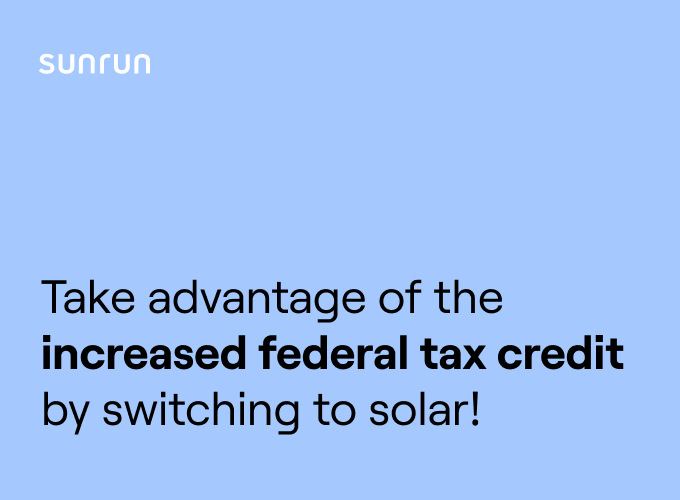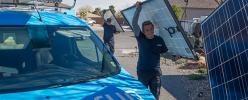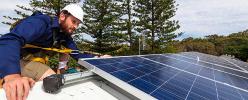How Expensive Are Solar Panels?

Solar Panel Costs on The Decline
The cost of a residential solar system has decreased over the last 10 years due to positive trends in supply and demand. From California to Florida, homeowners are turning toward solar energy and away from dirty fossil fuels. While increasing numbers of people go solar, it figures that the price of solar panels will continue to decrease. More competition and more widespread adoption mean better prices.
We are all concerned about the rise in pollution and the rise in our utility bills. This has created a growing interest in alternative, renewable energy, and solar is one of the most popular. We’re sure you’ve heard it before: we can get enough solar energy from the sun in one hour to provide the power needs of the world’s population.1
Sunrun & Residential Solar: One Rooftop at a Time
When you shop for rooftop solar panels, you’ll receive a quote for the entire purchase and installation of your solar system. In most cases the hardware includes solar panels, a controller, batteries and an inverter. But there are also permits, labor and additional business expenses from your installer.
How your roof is built is taken into consideration, as are the number of solar panels to fulfill your family’s energy needs. State and federal solar tax credits, solar incentives and rebates are taken into account when calculating your solar savings (and they can be significant) … and then installation begins. Once you determine your solar system size, you’re all set.
Basically, you’ll get a turnkey quote for your entire solar system. So get ready for your residential solar systems, reducing your carbon emissions, and a smaller utility bill.

See if you qualify for the
26% federal tax credit
Thanks so much! We'll call you shortly.
Sorry, we are not taking new customers in your area yet
Refer a friend. Get $1000
How Much Do Solar Panels Cost?
Where you live and how much sun you get will help determine your system size. For example, California gets roughly 70% of sun per year and Florida gets roughly the same.2 Prime real estate for going solar! For those states that get a lot of sun, your solar system requirements will be smaller. Less sun? You’ll need more solar panels to capture the sun’s power.
The cost of your panels is also determined by how much energy you need to run your home. And this cost is based on the kilowatts (kW) necessary to run your appliances. Or charge your electric car. Or keep your house humming during a storm or heatwave when a power outage occurs.
Bottom line? When you determine the size of your solar system you get to choose which appliances you want to connect. You are in charge of your power needs.
Kilowatts (kW) Determine Solar Costs
A kilowatt is a measure of 1,000 watts of electrical power. And your energy usage is measured in kilowatt hours (kWh). One kWh is the amount of energy you use if you kept a 1,000 watt appliance running for an hour.
Here is another popular example: A 100-watt light bulb operating for 10 hours would use one kilowatt-hour.
A conservative estimate is that for every kW you generate, you’re going to need about 100 square feet of solar panels. Not every state gets eight hours of sun, so count on 400 to 800 square feet of solar panels to capture the sun’s rays to power up most homes. And this would be a 4 kW to an 8 kW system.3
Many homeowners across America use roughly 4,000 watts to power up household appliances. Again, that’s a 4 kW solar system. But don’t forget about the components and energy nuances described above. They all have a say in what your solar system will cost. You could need an 8 kW system to meet your family’s energy needs, and some families have up to a 10 kW solar system.
Four kilowatt-hours of energy (or 4,000 watts) is enough to watch television for 40 hours, vacuum for four hours, wash 48 pounds of laundry, or work on your computer for 20 to 40 hours. So if you purchased a 4kW solar system, this is what you could do with the amount of energy supplied by your solar panel installation.4
Yes, we realize most people won’t want to vacuum for four hours, but as we mentioned, a professional solar advisor will help you determine what size solar system fits your home's energy needs. See our solar plans for details on our residential solar power pricing and features.
Incentives & Owning Determine Solar Costs
If you are considering a solar system purchase, you are going to like this: The federal government gives you a 30% solar tax credit. You get to deduct 30% from your federal income taxes from the cost of your solar system (your personal income tax credit).5
And there are many state and local governments that offer property and sales tax exemptions. Don’t forget to ask about cash rebates.6 These incentives add up to thousands of dollars of solar savings.
What does this amount to? In California, expect to pay $12,000 for a 6 kW solar system and $24,000 for a 10 kW (that’s a big system for a big house with a big family). In Florida, the range is about $9,000 to $19,000.7 Find out more about your states solar cost and savings.
Solar Prices Across America
Even though there are differences across every state (including your individual energy needs) that determine your solar system cost, the industry is still able to precisely predict the size of your solar system, your costs and savings profile. And you can count on your solar advisor and solar installer to walk you through everything.
If you want to dive deeper, use Sunrun’s solar calculator to see your potential solar savings and the positive environmental impact on your community. You can also find your solar state incentives and rebates.
Or give us a call. We love to talk solar. Get a complimentary solar quote that is specific to your energy needs. Contact us today.
David Zeledon
Sources:
1. https://helios.gsfc.nasa.gov/qa_sun.html
2. https://www.currentresults.com/Weather/US/average-annual-state-sunshine.php
3. https://www.solarpowerauthority.com/how-much-does-it-cost-to-install-sol...
4. http://insideenergy.org/2014/05/22/using-energy-how-much-electricity-do-...
5. https://www.seia.org/initiatives/solar-tax-exemptions
6. https://www.energysage.com/solar/cost-benefit/solar-incentives-and-rebates/
7. https://news.energysage.com/how-much-does-the-average-solar-panel-instal...
Recommended Articles
-

What Happens During a Solar Installation
So, you decided to make the switch to solar. Smart choice. And now that our experts have...
-

Underproduction
The energy that is generated below the committed level in a customer’s agreement.
-

Environmental Impact: A Grid-Powered Car
Are Electric Vehicles Better for the Environment? It’s true that a grid-powered car,...
-

Advantages of solar pv (photovoltaic) energy
Solar PV energy is clean energy One main reason to opt for solar energy is...